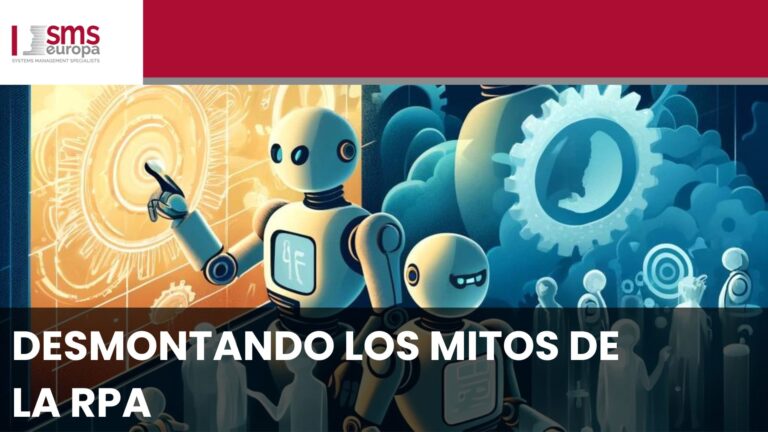Robotic Process Automation (RPA) technology has evolved rapidly, becoming a vital tool for companies seeking efficiency, accuracy and cost savings. However, several myths have been woven around this innovative technology that can confuse or divert attention from its true benefits. At SMS Europa, we believe in clearing the way for the adoption of transformative technologies through clarity and truth.
Here we debunk the five most common myths about RPA.
- Myth #1: Robots Will Replace Humans
The idea that robots will take over human jobs is a widespread but unfounded fear. The reality is that RPA presents itself as a complement to the workforce, freeing employees from repetitive and tedious tasks and allowing them to focus on higher value-added activities such as innovation and customer service.
- Myth #2: RPA = Physical Machines
When one thinks of “robots,” the image that comes to mind is usually that of physical machines. However, RPA is essentially software. It uses algorithms to automate routine digital tasks such as data entry and other activities that are normally performed on computers, not in the physical environment.
- Myth #3: RPA is Expensive
Although any technology requires an initial investment, RPA stands out for offering a significantly high return on investment in a relatively short period of time. Studies such as the one by Deloitte have shown that companies can see a return in less than 12 months, thanks to the elimination of inefficiencies and improved productivity.
- Myth #4: RPA Only Applies to Cost Reduction
Beyond cost reduction, RPA positively impacts multiple aspects of the business. From increasing productivity to improving customer service quality, accuracy and regulatory compliance, the benefits of RPA are holistic and transformative.
- Myth #5: RPA is for Simple Tasks Only
Far from being limited to simple tasks, the combination of RPA with technologies such as machine learning and natural language processing has given rise to intelligent automation. This evolution allows RPA to handle complex tasks, process unstructured data, and provide advanced analytics, extending its applicability to almost any business process.
Implementing Robotic Process Automation: Simple and Efficient
At SMS Europa, we facilitate RPA adoption through a four-step implementation model that includes process discovery, process analysis, proof of concept, and final implementation. Our approach ensures that companies not only adopt RPA effectively, but also maximize its benefits.
RPA is a powerful tool that is redefining the way companies operate, enabling them to be more efficient, accurate, and agile. By demystifying these misconceptions, we hope more organizations will explore how RPA can benefit them on their path to digital transformation.

